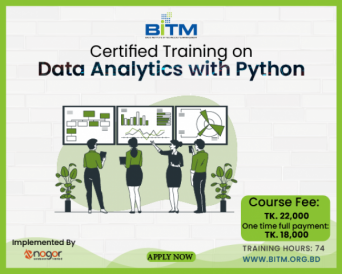This Training is jointly organized by BITM & Nogor Solutions Limited
Training will be held in Nogor Solutions Limited
Course Outline:
Module 1:
Theoretical Concept: Basic Concept of Data, Types of Data, (Qualitative/ Categorical Data, Nominal data, Ordinal data, Binary Data, Quantitative/ Numeric data, Discrete data, Continuous data), Sources of Data, Big Data, Cloud data and Data Mining.
Module 2:
Theoretical Concept: Python (Basic Concept, Introduction, History, Properties, Python Installation, Python Quick Start.
Module 3:
Theoretical Concept: Data Analytics Overview, Importance of Data Analytics, Types of Data Analytics, Descriptive Analytics, Diagnostics Analytics, Predictive Analytics, Prescriptive Analytics, Role of Data Analyst.
Module 4:
Python Basic: Python Syntax, Comments, Variables, Python String, Operators. (Practices and Problems Solving on completed topics)
Module 5:
Theoretical Concept: Data warehousing Components –Building a Data warehouse –- Mapping the Data Warehouse to a Multiprocessor Architecture – DBMS Schemas for Decision Support – Data Extraction, Cleanup, and Transformation Tools –Metadata.
Module 6:
Python Basic: Python List, Tuples, Sets and Dictionaries. (Practices and Problems Solving on completed topics)
Module 7:
Theoretical Concept: Database Overview and Database Management System, Data base Design.
Module 8:
Python Basic: Python Input and Output, Conditions (If-Else), Loop (For Loop and While Loop), Array. (Practices and Problems Solving on completed topics)
Module 9:
Theoretical Concept: Data measurement scales (Nominal, Ordinal, Interval, Ratio)
Module 10:
Python Basic: Python Functions and Python Modules, Dates, Math, and Python File Handling, (Practices and Problems Solving on completed topics)
Module 11:
Theoretical Concept: Fundamental rules of probability, Basic properties of probability, Sum of probabilities, complement rule, Probabilities involving multiple events, Addition rule for disjointed events, General addition rule (Theoretical Concept and Development with Python)
Module 12:
Theoretical Concept: Rules for Conditional probability and independence ( Multiplication rule for independent events, Conditional probability , General multiplication rule) (Theoretical Concept and Development with Python)
Module 13:
Python Basic: Python Modules-NumPy, Scipy, Pandas, Scikit-Learn, and Django, Creation of User Module (Practices and Problems Solving on completed topics)
Module 14:
Theoretical Concept: Measures of central tendency: Mean, Median, Mode, (Theoretical Concept and Development with Python)
Module 15:
Theoretical Concept: Measures of central tendency: Skewness, Kurtosis, Moments and (Theoretical Concept and Development with Python)
Module 16:
Theoretical Concept: Measures of central tendency: Variance (Range Quartile, Mean and Standard Deviation) (Theoretical Concept and Development with Python)
Module 17:
Theoretical Concept: Measures of Association (Covariance, Correlation and Regression Analysis) (Theoretical Concept and Development with Python)
Module 18:
Theoretical Concept: Linear Regression, Polynomial Regression and Logistics Regression with Scikit-Learn, (Practices and Problems Solving on completed topics)
Module 19:
Formative Test
Module 20:
Theoretical Concept: Sampling Overview, Types of Sampling Methods (Probability sampling- Simple random sampling, Systematic sampling, Stratified sampling, Cluster sampling) (Theoretical Concept and Development with Python)
Module 21:
Theoretical Concept: Types of Sampling Methods (Non-probability sampling-Convenience sampling, Consecutive sampling, Purposive sampling, Quota sampling Snowball sampling) (Theoretical Concept and Development with Python)
Module 22:
Theoretical Concept: Sampling Methods Analysis (Simple random sampling, Systematic sampling, Stratified sampling, Cluster sampling) (Theoretical Concept and Development with Python)
Module 23:
Theoretical Concept: Hypothesis Testing Overview, Types of Hypothesis Testing, Methods Hypothesis Testing (T-Test, Z-Test, F-Test, Chi Square Test) (Theoretical Concept and Development with Python)
Module 24:
Theoretical Concept: Hypothesis Testing Overview, Types of Hypothesis Testing, Methods Hypothesis Testing (T-Test, Z-Test, F-Test, Chi Square Test) (Theoretical Concept and Development with Python)
Module 25:
Data Visualization: Visualization methods, Histogram, Box plot, Scatter plot, Pie chart, Pareto chart, Q-Q plot. (Theoretical Concept and Development with Python)
Module 26:
Feature selection techniques: Filter methods, Wrapper methods, Embedded methods. (Theoretical Concept and Development with Python)
Module 27:
Feature selection techniques: Hybrid methods, Information Gains, Gini Index, Mapping and Encoding. (Theoretical Concept and Development with Python)
Module 28:
Machine Learning Algorithms: Linear Regression, Logistic Regression, Decision Tree. (Theoretical Concept and Development with Python)
Module 29:
Machine Learning Algorithms: Support Vector Machine (SVM), Naive Bayes, K-Nearest Neighbors (KNN) (Theoretical Concept and Development with Python)
Module 30:
Machine Learning Algorithms: Convolutional Neural Network (CNN), Generative Adversarial Network (GAN) (Theoretical Concept and Development with Python)
Module 31:
Machine Learning Algorithms: K-means, Association rules, Reinforcement learning, Q-learning, Temporal difference. (Theoretical Concept and Development with Python)
Module 32:
Machine Learning Algorithms: Ensemble learning techniques (Voting, Bagging, Boosting (AdaBoost, Gradient Boost, XGBoost), Random Forest)), Random Forest, Stacking, Blending, Random Forest. (Theoretical Concept and Development with Python)
Module 33:
Machine Learning Algorithms: Dimension reduction techniques, Missing Values Ratio, Low Variance Filter, Root mean squared error, Elbow method. (Theoretical Concept and Development with Python)
Module 34:
Project Work: Project Development using Machine learning Algorithm (Phase-1)
Module 35:
Project Work: Project Development using Machine learning Algorithm (Phase-2)
Module 36:
Project Work: Project Development using Machine learning Algorithm (Phase-3)
Module 37:
Final Test and Project Work Submission
Curriculum
| Data Analytics with Python |
Data Analytics with Python |
74 Hrs |
